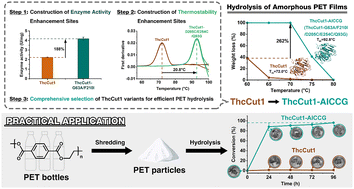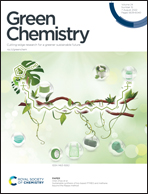Depolymerization of post-consumer PET bottles with engineered cutinase 1 from Thermobifida cellulosilytica†
Abstract
Bio-recycling of plastic waste is a promising solution to plastic pollution. As one of the most abundant plastic wastes, polyethylene terephthalate (PET) can be degraded by carboxylic ester hydrolases (EC 3.1.1). Nevertheless, the biological PET hydrolysis efficiency is always limited by the low activity and poor thermostability of the enzymes. Herein, to address the above barriers, we rationally mutated the relevant sites of Thermobifida cellulosilytica cutinase 1 (ThcCut1) involved in substrate binding. The wider substrate-binding pockets after mutation could facilitate the accessibility of the enzyme to the substrate. Divalent metal-binding sites were further predicted and substituted with disulfide bonds, with the aim of effectively improving the thermostability of the mutant ThcCut1. Coupled with sequence alignment and structural dynamics analysis, the ThcCut1-D205C/E254C/Q93G variant with a melting temperature exceeding the glass transition temperature of recycled PET was constructed. After comprehensively screening the active and thermally stable mutation sites, the resulting ThcCut1-G63A/F210I/D205C/E254C/Q93G (ThcCut1-AICCG) variant exhibited high enzymatic activity at a high temperature (70 °C). As result, 96.2% of the post-consumer PET bottle particles (without energy-intensive melt-quenching pretreatment) can be successfully degraded after 96 h of hydrolysis using ThcCut1-AICCG, which was 87.5 times higher than that using the wild-type ThcCut1. This novel strategy for amino acid site analysis will facilitate the modification of homologous cutinases to improve the catalytic performance, and provide a reliable technical method for constructing a PET hydrolase modification platform.



 Please wait while we load your content...
Please wait while we load your content...